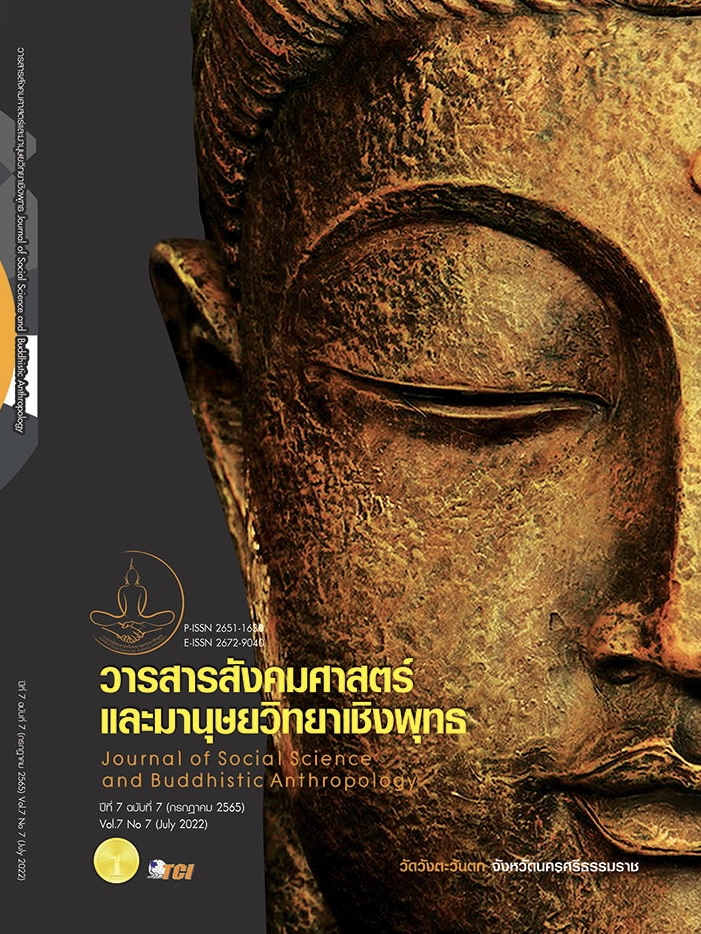INFLUENCING INTERACTIVE CRISIS SAFETY OF HEALTH DURING VIRUS PANDEMIC: CASE STUDY OF LOGISTICS PROVIDERS (3PLs) IN THAILAND
Keywords:
Safety Policies, Logistics Providers Truck Transportation, Pandemic, Preventive MeasureAbstract
The Objectives of this research article were to activities of Logistics providers (3PLs) to prevent the virus pandemic. This research are qualitative research and applied research It includes measures that affect the response to a crisis during the viral epidemic. A sample is 3PLs who have Q Mark licenses. The total is 324 companies around the country. A tool of this research is a Questionnaire that has been checked by the experts. Questionnaire items are measured by 1-5 rating scale. It consists of 6 subjects; Organization, Transporting Operation, Driver, Vehicle, Customer Service and Inner organization management, which total 18 questions. The dataset has been analyzed by multiple regression to analyze such relationships. The final model included 8 questionnaire items which is predictable approximately 65%. The results found that the simple countermeasures and rapid processing (e.g., measuring body temperature, there are health and safety policy of organization and training transporting staff) are most influence the level of crisis health retaliation. Regarding the contributions of this study, the 3PLs both of having and unhiving Q mark license can select the countermeasure activities to prevent the virus pandemic. Moreover, the public and private organizations who are supervising the truck operations can use the result of this study to promote the effective virus pandemic countermeasure.
References
Balogun, H. et al. (2021). Boruta-grid-search least square support vector machine for NO pollution prediction using big data analytics and IoT emission sensors. Applied Computing and Informatics, 18(2), 1-13.
Baştuğ, S. & Yercan, F. (2021). An explanatory approach to assess resilience: An evaluation of competitive priorities for logistics organizations. Transport Policy, 103(1), 156-166.
Bayoumi, E. et al. (2021). Investigating the Impact of COVID-19 on the Logistics Sector: A Case Study on Egypt. Global Business and Management Research: An International Journal, 13(3), 167-172.
Beck, M. J. & Hensher, D. A. (2020). Insights into the impact of COVID-19 on household travel and activities in Australia - The early days under restrictions. Transport Policy, 96(1), 76-93.
Butt, A. S. (2021). Supply chains and COVID-19: impacts, countermeasures and post-COVID-19 era. The International Journal of Logistics Management, 33(2), 1-24.
Choi, T. M. (2021). Risk analysis in logistics systems: A research agenda during and after the COVID-19 pandemic. Transportation Research Part E: Logistics and Transportation Review, 145(1), 1-8.
Department of Land Transport. (2021a). Transportation Statistical Report. Retrieved january 12, 2022, from http://www.dlt.go.th/minisite/m_upload/ editor-pic/technplan/files/Apr2564.pdf
Department of Land Transport. (2021b). Trucking Service Quality Standard (Q Mark. Retrieved january 12, 2022, from https://www.thaitruckcenter.com/ qmarkV2/
Ketudat, S. & Jeenanunta, C. (2021). Impact of the COVID-19 pandemic on logistics firms and their resilience: case studies in Thailand. Engineering Management in Production and Services, 13(3), 86-98.
Lemke, M. K. et al. (2020). A novel COVID-19 based truck driver syndemic? Implications for public health, safety, and vital supply chains. Am J Ind Med, 63(8), 659-662.
Maemunah, S. & Cuaca, H. (2021). Influence of Epidemic COVID–19 on Business Strategy, Information Technology and Supply Chain Agility to Firm Performance in Medical Device Industry. Linguistics and Culture Review, 5(S1), 661-669.
Ogunnusi, O. N. (2021). On the Partial Least Square Regression Modeling to Collinear Regressors: Contribution of Transportation Sector to Nigeria Economic Growth. International Journal of Innovative Science, Engineering & Technology, 8(4), 231-245.
Onputtha, S. et al. (2020). Adjustment of Logistics Business Entrepreneurs toward Thailand 4.0 Policy. Journal of Logistics and Supply Chain College, 6(1), 117-135.
Prakongsai, P. et al. (2020). Self-Assessment on Capacity Gaps and Readiness in Attaining National Accreditation for Ethics Commit-tees under Ministry of Public Health of Thailand. Journal of Health Science, 29(4), 679-688.
Restuputri, D. P. et al. (2021). The effect of logistic service quality on customer satisfaction and loyalty using kansei engineering during the COVID-19 pandemic. Cogent Business & Management, 8(1), 1-35.
Ruangsriroj, T. & Donkwa, K. (2020). Influence enhancement factors for service quality on road freight transportation service performance of logistics service providers. NRRU Community Research Journal, 14(2), 57-68.
Shi, J. et al. (2021). Radiology Workload Changes During the COVID-19 Pandemic: Implications for Staff Redeployment. Academic Radiology, 28(1), 1-7.
Singh, S. et al. (2020). Impact of COVID-19 on logistics systems and disruptions in food supply chain. International Journal of Production Research, 59(7), 1993-2008.
Tantrarungroj, P. (2015). Satisfaction with the Online Teacher Self-Evaluation System : A Case Study of Members of the Faculty of Education, Chulalongkorn University. Journal of Education Studies, 43(4), 146-157.
Tsai, C. A. et al. (2021). Model for Evaluating Outsourcing Logistics Companies in the COVID- 19 Pandemic. Logistics, 5(3), 1-15.
Walters, L. et al. (2021). Food and Agricultural Transportation Challenges Amid the COVID-19 Pandemic. Agricultural & Applied Economics Association, 35(3), 1-8.
Xie, J. et al. (2020). A Predictive Nomogram for Predicting Improved Clinical Outcome Probability in Patients with COVID-19 in Zhejiang Province, China. In Engineering (Beijing), In press. Zhejiang Province, China.
Yang, S. et al. (2021). Dynamic impacts of COVID-19 pandemic on the regional express logistics: Evidence from China. Transport Policy, 111(1), 111-124.
Zhan, J. & Lu, S. (2021). Influence of COVID-19 Epidemic on China and Global Supply Chain and Policy Suggestions. Open Journal of Business and Management, 9(5), 2497-2512.
Downloads
Published
How to Cite
Issue
Section
License
Copyright (c) 2022 Journal of Social Science and Buddhistic Anthropology

This work is licensed under a Creative Commons Attribution-NonCommercial-NoDerivatives 4.0 International License.









